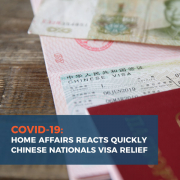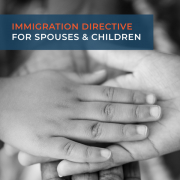Archive for year: 2020
NEWS | IMMIGRATION DIRECTIVE FOR SPOUSES AND CHILDREN
/in Archived, News /by xp-adminPrior to this, foreign spouses and children were not allowed to change status from an entry/holiday visa to a long term visa from within South Africa and as such were required to return to their home countries and submit the applications at their nearest South African mission. The missions would further retain the applicant’s passport which therefore made it impossible for them to travel to South Africa whilst awaiting their visas.
This process created a significant burden as families were being separated and sometimes for long periods of time. The Constitutional Court of South Africa has recognised this problem and measures have now been put in place to allow foreign families to submit their Temporary Residence visa applications and remain in South Africa whilst awaiting the outcome.
Going forward, this judgement will ease the visa process for families of South Africa citizens and Permanent Residency holders who will be able to reside in South Africa and continue with their day to day activities whilst awaiting their Temporary Residency visas.
Shortly after the judgement was delivered, the Department of Home Affairs in South Africa released an official Immigration Directive confirming these changes and advising all South African missions abroad to adhere accordingly.
For further information regarding the process for spousal or dependant visas, please do not hesitate to contact us for a consultation.
NEWS | BUSINESS OR WORK TRIP? A TARGET FOR IMMIGRATION INSPECTIONS IN MOZAMBIQUE
/in Archived, News /by xp-adminWith this increase in the number of projects, companies, particularly foreign owned, are on the radar of both the Ministry of Labour, and the Department of Immigration. These companies are targeted for Immigration compliance in Mozambique by both Immigration and Labour departments through regular audits and inspections. Companies are, therefore, recommended to take the necessary precautions to ensure compliance due to the increasing number of penalties, fines, and suspensions issued.
The Department of Immigration and the Ministry of Labour in Mozambique are two separate departments responsible for the compliance of foreign nationals in Mozambique. The Department of Immigration issues residence permits, visa extensions, and governs the use of visas issued by the Mozambican diplomatic missions abroad. The Labour Directorate, on the other hand, governs the issuance of work permits.
Use and Validity of a Business Visa
Business visas for Mozambique can only be issued at the Mozambican diplomatic missions abroad and currently cannot be obtained upon arrival except by Angolan nationals. Even other nationalities that are part of the SADC region are recommended to apply for a business visa at a Mozambique consulate or embassy prior to attending meetings in Mozambique. These are generally issued with a validity of 90 days, single or multiple entry, and, in exceptional circumstances, may be issued for 180 days. Despite the validity of 90 days, the duration of each stay in-country cannot exceed 30 days. The Department of Immigration may extend a stay in-country in extraordinary circumstances; however, in practice, business travellers are required to exit and re-enter provided they have been issued multiple-entry visas.
The Broad definition of Work
Immigration inspectors are responsible for ensuring that foreign nationals obtain the appropriate visa type depending on the nature of their activities. Where activities have extended beyond that of business, that is, other than business meetings, attending conferences, or attending a training session, Labour inspectors may construe your activities as work. Labour inspectors are stringent in ensuring that any form of work activity whether it is working in an office behind a desk, conducting a training session, handling of equipment, auditing financial accounts, and so on, require a short-term work permit to accompany a business visa. As such, the definition of “work” is broad in Mozambique, and often determined at the discretion of the Labour inspectors. To avoid suspension of the business travellers, and the issuance of penalties and fines on the inviting Mozambican company, a short-term work permit can be applied for prior to travel.
How Does One Apply for a Short-term Work Permit
Short-term work permits in Mozambique are applied for at the Labour Directorate in the province where the work is expected to take place and can take up to 3 weeks to be processed. It is not endorsed in the applicant’s passports and, as such, it can be applied well in advance for intended travel for work-related purposes. Short-term work permits can be valid for up to 90 days or 180 days in a calendar year for the non-oil and gas, and oil and gas sectors respectively. Document requirements and processes are straightforward and hassle-free.
Takeaway
It is important to take note of the restrictions placed on business visas as well as short-term work permits in Mozambique. Individuals and companies are held accountable for their immigration compliance to the requirements of both the Department of Immigration and the Ministry of Labour and should ensure the appropriate visa type and work permits are in place to avoid immigration penalties, fines, and suspension of foreign nationals.
AUTHOR 
Tarissa Wareley
Immigration Specialist
NEWS | NEW UK POINTS-BASED IMMIGRATION SYSTEM – SET TO IMPACT EMPLOYERS RELIANT ON UNSKILLED WORKERS
/in Archived, News /by xp-adminThe UK Government has announced its plans to introduce a points-based-post-Brexit immigration system. Consequently, low-skilled workers and non-English speakers will no longer qualify for UK visas and the Home Office stated that EU and non-EU citizens intending to relocate and work in the UK, would be treated equally following the end if the UK-EU free movement on 31 December 2020.
Below an overview of the proposed new points-based-system.
A person would need 70 points to apply to work in the UK
| Characteristics | Essentials | Points |
| Offer of job by approved sponsor | 20 | |
| Job at appropriate skill level | 20 | |
| Speaks English at required level | 10 | |
| Salary of £20,480 (min) – £23,039 | 0 | |
| Salary of £203,480 (min) – £25,599 | 10 | |
| Salary of £25,600 or above | 20 | |
| Job in a designated shortage occupation | 20 | |
| Education qualification: PhD in subject relevant to job | 10 | |
| Education qualification: PhD in a Stem subject relevant to the job | 0 |
HOW WOULD THIS WORK?
The proposed points-based system indicates that any individual wishing to apply for work in the UK must have gained at least 70 points to qualify. In order to gain the prescribed amount of points, the individual must have at least a) received an offer of employment, b) hold the appropriate level of skill(s) to complete the job at hand, c) must be English speaking and d) receive a salary of +£25,600.00.
Where certain criteria cannot be met, the individual could alternatively gain points by occupying a position deemed critical, hold a PhD in relation to current employment and/or hold a PhD in a Stem subject relevant to the proposed employment.
In special circumstances, the lowest salary threshold of £20,480.00 will be considered for occupations that are deemed shortage of skills e.g. nursing.
WHAT CAN BE EXPECTED?
The Government hopes that weaning businesses from an inexhaustible supply of low skilled labour will increase wages, training, investment and productivity. “It is important that employers move away from a reliance on the UK’s immigration system and as alternative to investment in staff retention, productivity, and wider investment in technology and automation”, the briefing paper added.
Expectedly, the new policy drew immediate criticism from UK employers and industry leaders by accusing the Government of an assault to the economy and warned of “disastrous” consequences. The NHS as the 3rd largest employer for example has a work force made u of no less than 13% foreign nationals staff. UK employers further warned on staff shortages should insufficient time be provided for adjustment towards this new system. UK employers finally pointed out that certain low-skilled occupations are vital to wellbeing and business growth and this could be an end-the-era of low skilled EU labour in factories, warehouses, hotels and restaurants – this appears to be a remaining concern to UK employers and EU citizens.
INDUSTRIES EXPECTED TO BE HIT HARDEST BY THE NEW SYSTEM
- The social care sector – majority of people employed by the adult social care sector are low-paid workers providing daily help to older and disabled adults in care homes and the community. Foreign nationals currently make up 1 in 6 of the 840,000 care workers in England. Care work is not classed as a shortage occupation and will fall well short of the 70 points required with pay under £20,000 on average.
- Construction concerns over worker shortages – construction relies on foreign migrants for 10% of its workforce. Major infrastructure projects including the proposed building of a third runway at Heathrow, and ambitions to build more than 200,000 new homes per year mean that many construction firms fear that there are simply not enough UK workers to fill the gap these new restrictions will create.
- NHS needs smooth supply of foreign workers – with a number of jobs on the shortage-occupation list, including nursing, will make it easier to attain the 70 points needed to qualify. The pay attached to such jobs, unlike that of social care workers, will mean they can gain points too. However lower paid staff, such as healthcare assistants and porters, could be affected.
- Points system good for university scientists – they may take some reassurance from a points system weighted towards scientists and researchers. For instance, even if a maths researcher has a salary below the minimum threshold, they might still get enough additional points from having a PhD. The fast-track “global talent” entry route will be seen as recognition of a competitive, international market in attracting top scientists. They is however concern about losing staff below the income threshold, such as laboratory technicians.
- More temporary farm workers needed – the seasonal-workers scheme, which allows temporary workers access to the UK to harvest fruit, vegetables and flowers, has now been expanded from 2,500 to 10,000 places – but farming organisations say 70,000 are needed across the UK. Farms that also carry out food processing and packing say more clarity is needed on how those staff might be recruited.
- Visas may be harder for retail workers – people wanting to come to the UK to work in shops and cafes are likely to find it difficult to get a visa in the future. Anyone already here working in retail jobs will be able to stay and apply for settled status. But those wanting to come to the UK after the end of the transition period will need an offer of a “skilled” job paying more than £25,600.
The Government intends to launch a comprehensive campaign to prepare UK employers for the transformation in January 2021 when EU citizens will be considered and treated equal to other nationals.
Sources: The Guardian and BBC News
NEWS | BUDGET TIP: ATTRACT SKILLED FOREIGN TALENT
/in Archived, News /by xp-adminMany are now breaking residency with South Africa as they do not plan to return and are looking at careers and retirement plans which does not include South Africa. One expatriate stated emotionally; their family has made the decision to ‘divorce’ South Africa.
There is no doubt a haemorrhaging of South African talent and with no formalised and centralised government tracking in place, there is perhaps a bit of an ostrich mentality as to the severity of the brain drain. As one of the largest work permit providers, we increasingly see South African employers having to import critical skills into South Africa to fulfil key positions, but these skills do not always come with their families and their intentions are often to export their earnings to their home countries, as opposed to permanently settling and becoming permanently part of our society.
Most developing countries, including the well-developed countries such as the United States, Australia and European States, have long realised that foreign talent does not steal local jobs. It stimulates the economy, brings in foreign capital and stimulate local job creation.
Almost without exception, their message is that their borders are welcoming foreign investors and critical skills; with private public partnerships in many instances to target this sought after groups of society. Skills across sectors such as Information, Communication and Technology, Engineering and Executive Management have long provided a springboard for industries to develop and enable economic growth. It is therefore a sound conclusion that the quickest way to grow an economy is with an injection of skills.
In anticipation of the budget speech, I caveat the Minister that no matter how much extra tax he is able to collect or expenditures he may cut, the books will not balance long term in the absence of policy changes that allow for the attracting and retention of foreign capital and skills.
Having a visa regime and overall business culture that is welcoming to foreigners is also important when it comes to positioning South Africa as the gateway to Africa. South Africa’s ability to compete for and attract critical skills globally and the projects they enable, is key to realising our growth aspirations and increasing job opportunities and economic stability.
All government departments should be placed on notice that foreign investment should be treated with a clear message of welcome, which goes beyond mere rhetoric from certain ministers. Zimbabwe also thought they had lots of time and anyone who disagrees should pop over for a quick lesson on what happens when you displace talent, from all backgrounds, and do get it right to find the right foreign investors.
FIND US
Johannesburg
17 Eaton Avenue,
Bryanston, Johannesburg,
Gauteng, 2191
South Africa
George
55 York Street
Dormehls Drift
George, 6529
South Africa
CONTACT US
Telephone:
South Africa: 011 467 0810
Postal:
PO BOX 35046
Northcliff
2115
IN THE NEWS
- Another Positive Move To Attract More Tourists To SA
- Bringing in the Bomb Squad at Home Affairs
- How Home Affairs’ Immigration Reforms Could Drive SA’s Growth in 2025
- Phindiwe Mbhele on Remote Work Visa: Splendid Cape Town is wooing more and more digital nomads
- Cape Town Shines, and So Does South Africa’s New Critical Skills Visa Overhaul





